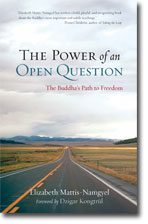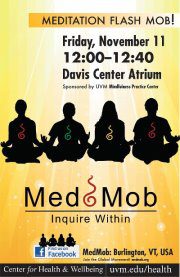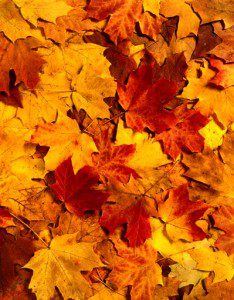 As I’ve mentioned before, I love the look and feel of books. I have yet to buy my first ebook, although that can’t be too far in my future. I am reading the Power of an Open Question: The Buddha’s Path to Freedom by Elizabeth Mattis-Namgyel. It’s a slim, hard-cover volume, approachable and dense with the Buddha’s wisdom.
As I’ve mentioned before, I love the look and feel of books. I have yet to buy my first ebook, although that can’t be too far in my future. I am reading the Power of an Open Question: The Buddha’s Path to Freedom by Elizabeth Mattis-Namgyel. It’s a slim, hard-cover volume, approachable and dense with the Buddha’s wisdom.
Close to my heart, Power of an Open Questions opens with a metaphor — the uncertainty that can come with rock climbing. Being stuck in a place on a boulder can lead to panic or, if the mind can relax, we can begin to notice things we hadn’t noticed before, including the path out of the predicament.
The dilemma is between seeking security and freedom. “The way we respond to the stream of momentary experiences we call “our life” determines our move toward our habitual search for security or toward awakening.” Panic in the face of uncertainty or unpleasantness keeps us from being in an open state — and it is in this open state where we experience freedom and that fullest sense of being alive.
Life is full. In fact, life is so touching, curious, sad, exciting, scary, and bittersweet it’s almost unbearable at times. But as human beings, we need to ask ourselves: “Must we turn away from life’s fullness?” To turn or not to turn–to stay open–this is the question. And this kind of questioning takes us deep into the heart of personal inquiry and shows us how to fully embrace our humanity.
There are countless books on the dharma and when it comes down to it, all of them say more or less the same thing. The reason we keep reading them is that once in a while we find one that speaks to us in a way that connects us to the truth that is always right in front of us. This book might do that for you.
She draws a parallel between the Buddha’s search for an answer with the stance of the open question. What other choice do we have in the face of impermanence and its attendent uncertainty? Taking refuge in the obscuring comfort of thinking about our lives rather than living them; taking refuge in fundamentalism and other forms of ideological succor. To be open is to be awake; to be awake is to be open. To be open is to not base your well-being on getting your way. It’s the willingness to be surprised — even if that surprise is not what you wanted.
I am reminded of the poet Rilke when we said in his Letters to a Young Poet:
You are so young, so much before all beginning, and I would like to beg you, dear Sir, as well as I can, to have patience with everything unresolved in your heart and to try to love the questions themselves as if they were locked rooms or books written in a very foreign language. Don’t search for the answers, which could not be given to you now, because you would not be able to live them. And the point is, to live everything. Live the questions now. Perhaps then, someday far in the future, you will gradually, without even noticing it, live your way into the answer.
The specifics of the path seem secondary. She presents the open question within the context of Tibetan Buddhism, which I’ve been thinking about lately, but it goes beyond this to a more universal consideration. My first exposure to Buddhism was the Tibetan Buddhist path. As a young adult, I was fascinated with the color, pageantry, ornate iconography, and the jolly teachers promising enlightenment in just seven years of committed study. After taking the Bodhisattva vows from His Holiness the Dalai Lama in 1985, I never pursued that path. Instead, I gravitated towards the relatively spare practice of vipassana. In retrospect, I can attribute this transition to two factors. The first is that visualization is not my predilection and Tibetan Buddhist practice is imagery intensive. I preferred the solid, grounded in the body methodology of anapanna sati and vipassana. The second, probably unconscious at the time, was a hesitation regarding organized religion.
At its heart the open question is about living the dharma and this requires no visualizations or organized religion.
Also available in paperback.

